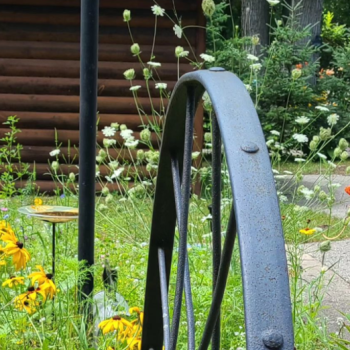Why do we talk about the flourishing of all people and things when we talk about justice? As this column is called “Flourishing Faith and Justice” it seems relevant to share why we use the term flourishing and what it has to do with the Hebrew word, shalom.

A Flourishing Garden
As I frequently do during the first part of our prayer gathering, I had snuck off into another room of the building to write in my journal. After a busy day spent with family, I feel peace wash over me as I sip on my water. I breathe in deeply and begin thinking about God. I love the wall-sized window in here, where the evening light always hits the garden outside just so. The shiny evergreen leaves on the bushes, the bright firework blossoms, and the stark white tree bark all glow in the evening light. No matter what season it is, this small section of the world flourishes.
Shalom is Justice
The ancient Greek philosopher, Aristotle, advocated for eudomenia, a happiness resulting from humankind flourishing. I’ve found a few references claiming this idea originated from him. However, this type of flourishing is referred to through the wide-historical range of God’s redemptive story.
The term that I see best used to describe the flourishing of all is shalom, a word found through the text of the Torah and Bible. Many of us think of shalom as simply meaning “peace be upon you,” as it is used in greeting. But this word describes not just peace, but a peace that is so encompassing that there is no room for evil, injustice, or brokenness. Justice in its purest form is shalom, for it is the state when everything is made right. It is wholeness. It is wellness. It is flourishing.
Restoration
So much of the good news we adhere to in Christianity hangs on the hope of restoration. From Eve and Adam to the patriarchs, to the prophets and to the psalmists, we see a story of a world longing and being primed to flourish. In the Old Testament, humankind was positioned towards the hope of shalom. Then from Jesus, to now, this story continues and will do so until it concludes, regardless of how we each interpret the book of Revelations. With more context and clarity, we have a clear path to move us into a flourishing world. We have the restoration of our relationship and right standing with God. And as we look with hope to everything finally being made right “at the end,” we actively move towards a world restored, to shalom, by living out the teachings and ways of Jesus.

Why I Use the Term Flourishing
As we consider justice (shalom) from a Christian standpoint, we aren’t just talking about our good and personal happiness, but goodness and happiness for all. Maybe it is just me, but the word “good” is still a term that exudes a meaning less than great. And great isn’t as excellent a word as flourishing is, which is active and expanding. I love the term flourishing because it gives no doubt to what we are aiming for. This is why I use flourishing in the title of this column.
The Task of Flourishing
Honestly, the etymology or exact semantics of the word flourishing isn’t the most important thing. It just gives me descriptive language to better marvel at the beautiful glowing garden in front of me. For this garden to flourish, the unsightly, dead bushes were ripped out. It is pruned, weeded, and fertilized. It is intentionally developed and is cultivated.
In Eden, humankind was tasked with globally expanding the cultivation of a garden likely much more magical than the one outside this window. Jesus too tasked his followers with multiplying, so that those who’d trust in him and live out his ways would extend through the earth. What type of garden is God cultivating globally today? And how can it flourish? I can only give you a snapshot of moments of shalom, and even these don’t come without a gardener’s intention to bring it about.
What I Need To Flourish
For example, let’s use this movement of peace to pray here, by this window. To be here, I had to ensure a babysitter. I had to have the miracle of my physical recovery, so I could leave my hospital bed. When I was still in a wheelchair, the room had to be wheelchair accessible. I’d have to be pushed, as I lacked the strength. To be in this space, right now, I have to live in a governmental system that gives me the freedom of speech and movement to meet with other believers. I had to have access to resources to travel. There was no fighting in the street, preventing my safe passage. I had to live in a city with ordinances that let us convert a business center into a gathering place for multiple faith communities. The leaders of these faith communities had to have both funding and no prejudices against them in order to secure this space. The building owner also had to make enough money and value beauty enough to maintain a perennial drought-resistant garden next to the building.
Most of these elements aren’t personal, for my own individual happiness. And yet all of them add together to help me flourish. Emotionally grounding, physically and mentally resting, having spiritual communion with God, and connecting with other believers makes me happy, true. But it doesn’t just impact me positively in this secluded moment. It fills me deeply in a way that helps me through the following days. This time in the “secret place,” as Jesus called it, also empowers me to love and care for others better. I don’t take this for granted.
Moving Closer to Shalom
Do you ever consider the factors and things in place that help you flourish? What about others you know? What would flourishing look like in your community, nation, and world? These are all questions that those who value justice intentionally think about, as they help us move closer to the peace of God, shalom.
We are the ones being cultivated, like trees of righteousness. Through us, our society transformed, with the ways of heaven being established on earth. And we still long for the final day where the promise of the tree’s leaves of God’s the eternal city will bring healing to the nations. In all of this, we point towards shalom, true justice. We see the expansion of what is lovely, redeemed, restored, and, indeed, flourishing.














